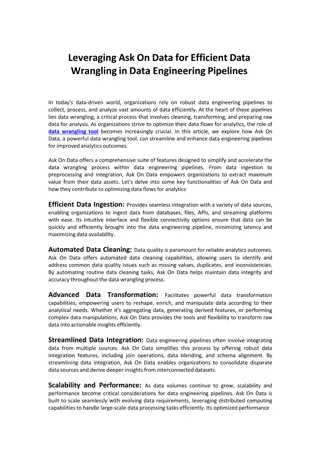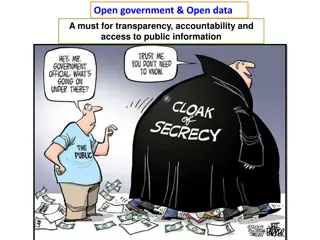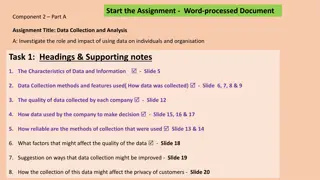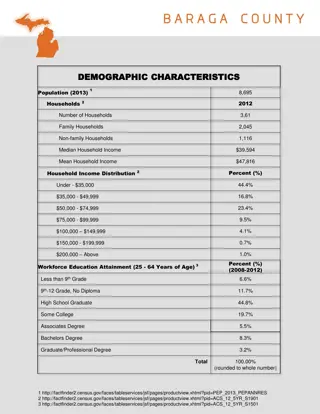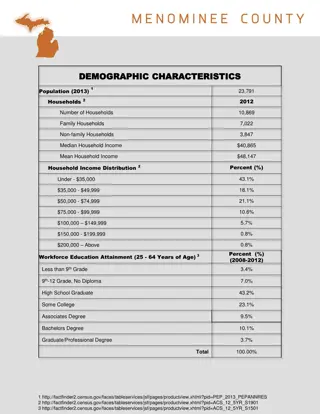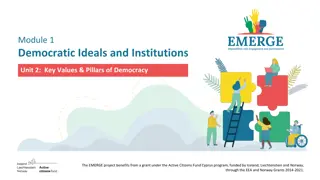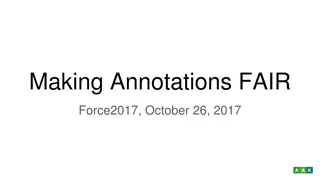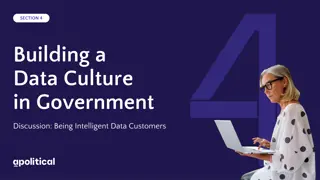Understanding Open Government Data Principles and Benefits
Open Government Data (OGD) principles and policies play a vital role in promoting transparency, citizen engagement, innovation, and data-driven decision-making in government operations. Governments worldwide are adopting open data policies to enhance accessibility, reusability, collaboration, privacy protection, and data security. Despite the benefits, challenges exist in implementing these principles effectively.
Download Presentation

Please find below an Image/Link to download the presentation.
The content on the website is provided AS IS for your information and personal use only. It may not be sold, licensed, or shared on other websites without obtaining consent from the author. Download presentation by click this link. If you encounter any issues during the download, it is possible that the publisher has removed the file from their server.
E N D
Presentation Transcript
What did we learn in the last meeting? Do you have a small task to do or something to read/study?
What is "Open Government Data" (OGD) and why is it important?
Government Data and Open Government Saide Dept. Information Systems, UIN SUSKA Riau https://saide-sank.blogspot.com
Open data principles and policies 3 main topics Benefits and challenges of open government data Data-driven decision- making in government
Open Data Principles and Policies in Digital Government Open data principles and policies play a crucial role in shaping the digital government landscape
Open Data Principles Governments worldwide have formulated open data policies to guide the release and management of government data Transparency: Digital government initiatives should prioritize transparency by making government data accessible to the public Accessibility: Data should be made available in formats that are easily accessible to all citizens, regardless of technical expertise Reusability: Data should be shared in a way that encourages its reuse Collaboration: Governments should actively collaborate with external stakeholders, including citizens, businesses, and non-profits, to leverage their expertise and enrich the data ecosystem Privacy and Security: While promoting openness, digital government must protect individuals' privacy and ensure the security of sensitive data
Benefits of Open Data Principles and Policies: Enhanced transparency in government operations Increased citizen engagement and trust Fueling innovation and entrepreneurship Facilitating data-driven decision-making in government
Challenges to Address Despite the benefits, digital government faces challenges in implementing open data policies, including privacy concerns, data quality issues, and the need for robust data governance
Examples of Open Data Policies: Provide examples of countries or regions that have implemented successful open data policies, such as the United States' Data.gov, the United Kingdom's data.gov.uk, or Canada's Open Government initiative
How can open government data benefit citizens and society as a whole?
Benefits and Challenges of Open Government Data in Digital/E- Government
Open Government Data is a cornerstone of digital and e-government initiatives It involves making government data accessible and usable by the public and businesses
Benefits of Open Government Data
Transparency and Accountability OGD promotes transparency in government operations, allowing citizens to monitor and hold government agencies accountable
Innovation and Economic Growth Accessible government data fuels innovation by enabling the development of new apps, services, and solutions This, in turn, stimulates economic growth
Citizen Engagement OGD encourages citizen participation in decision-making processes, fostering greater engagement and trust in government
Improved Services Digital government services can leverage open data to enhance their offerings and provide citizens with more effective solutions
Data-Driven Decision- Making Government agencies can make more informed decisions by analyzing data, leading to better policy development and resource allocation
Are there any challenges or concerns related to open government data, such as privacy, security, or data accuracy?
How can governments ensure that open government data is used responsibly and ethically by individuals, businesses, and researchers?
Challenges of Open Government Data
Privacy Concerns Balancing openness with privacy protection is a challenge Sensitive information must be safeguarded
Data Quality and Reliability Ensuring the accuracy and reliability of government data can be difficult, and errors can impact decisions
Data Governance Effective data governance is required to manage data, ensure security, and maintain data quality
Digital Divide Not all citizens have equal access to digital resources, potentially creating disparities in data access and usage
Interoperability Data from various government agencies may be stored in different formats and systems, making integration challenging
Are there any specific open government data projects or areas of interest that you would like to explore further?
DATA-DRIVEN DECISION- MAKING IN GOVERNMENT
Data-driven decision-making is a critical component of modern government strategies, particularly within the digital government framework
Definition Data-driven decision-making refers to the process of using data and analytics to inform and guide government policies, initiatives, and actions
Role in Digital Government In digital government strategies, data serves as the backbone for informed, efficient, and citizen- centric governance
Can you provide examples of government data that can be made open and accessible to the public?
Data Sources Governments collect data from various sources, including citizen interactions, IoT devices, administrative records, and open data
Data-driven decision-making offers several advantages in the digital government context, including Enhanced policy effectiveness Improved resource allocation Benefits Predictive capabilities Better service delivery Greater transparency and accountability
Challenges Implementing data-driven decision-making involves overcoming challenges such as data quality, privacy concerns, and the need for data governance
Data-driven decision-making is a central pillar of digital government strategies Digital Government Strategy It aligns with the goals of digital transformation and citizen-centric services





